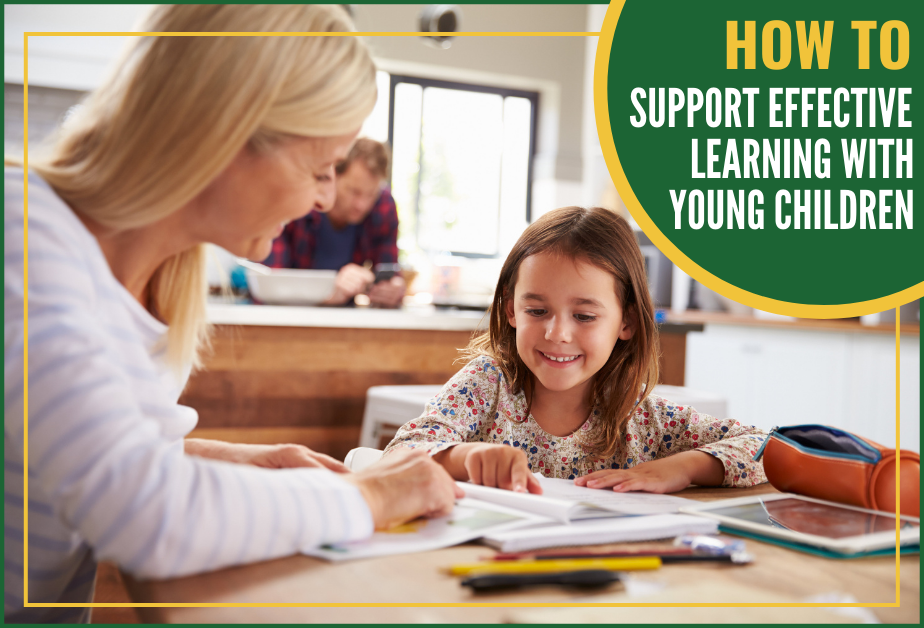How to Support Effective Learning With Young Children
The foundation for future success is built during each child’s earliest years of life. The first few years are so important because when you ensure effective learning during these formative years, it will lay the groundwork for a more successful academic future.
As a parent, your involvement in your child's learning and education is paramount. You can support effective learning with young kids by encouraging them to be curious, to take chances, and to learn through play and exploration. Here are some effective learning strategies that will help guide both you and your child towards academic excellence:
Determine your child's learning style
Every child has a unique learning style. There are four primary learning styles:
-
Visual (refers to people who learn best by seeing)
-
Auditory (refers to people learn best by hearing)
-
Reading/Writing (refers to people who learn most effectively when utilizing these skills)
-
Kinesthetic (refers to people who learn best when physically engaging in the material)
Bear in mind that your child may have a combination of more than one style. Take time to find out whether your child learns best through touch, movement, sound, or sight, and work to provide an effective learning environment and experiences accordingly.
For example, with children who are visual learners, it is best to incorporate visuals when teaching a new concept. You might draw pictures to help them gain a stronger understanding of an idea, or use colors, shapes, and lines to emphasize a message or connect pieces of information.
Weave learning into playtime
Did you know that sometimes, self-directed play can be just as effective as formal academic instruction? Many experts now believe that children who engage in learning through play are able to gain knowledge and explore new concepts at the same time, and they may even realize they are learning.
Provide appropriate learning tools
The types of toys with which your child plays can also play a role when it comes to effective learning and cognitive development. Toys like blocks, puzzles, or dolls can help children solve problems and develop fine motor skills. On the other hand, playing with toys like balls or vehicles can enrich the development of gross motor skills. Experts agree that both types of play can greatly enhance children’s practical learning skills.
Encourage effective communication
communication is critical when it comes to the success of both professional and personal relationships. The same concept applies to effective learning. Open communication with children allows you to have a better understanding of what they are thinking, feeling, and experiencing throughout the learning process.
If your little one seems to be struggling, don't be afraid to ask questions. You can help by helping your child make effective connections between what’s happening in the classroom and how it might affect home life. Furthermore, listen carefully. This will allow you to determine whether your child needs additional explanation or more examples before applying a new concept.
Teach your child about time management
When it comes to managing time, every child is different. Some kids are more focused, proactive problem-solvers, while others tend to be more spontaneous or creative. Time management is a vital component of effective learning, as it helps children stay organized and on track with the learning process.
Many children may benefit from developing a daily schedule that outlines specific times for meals, sleeping, playing, and studying or homework. This helps them visualize what they can expect each day and more effectively plan their time accordingly. It can also prevent feeling overwhelmed by too much work all at once. If you find that this strategy does not work for your child's unique personality type, consider allowing extended playtime so your little one’s mind can rest after intense periods of concentration.
Make learning fun
Learning is meant to be a positive and enjoyable experience, not something that causes unnecessary stress and anxiety. If your child feels this way in any learning situation, you can find ways to make the process more engaging and interactive, which in turn will help your child want to learn instead of dreading the process. For example, try brainstorming new ideas for playtime with blocks, or talk through new concepts in a way that makes sense for your child's unique personality.
Remember that learning doesn't only happen in the classroom! As a parent, you are your child's most important learning tool. Use these strategies to help build children’s confidence, and help them achieve academic success now and for their future.
At Mrs. Myers' Learning Lab, we believe that all children can be happy, successful, and confident learners, regardless of their current reading level. Contact us to learn more about our center.





